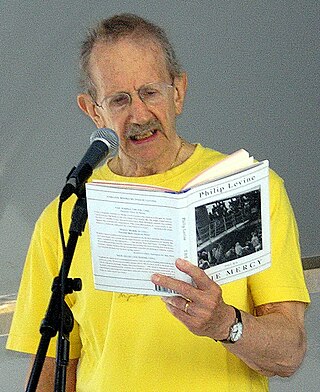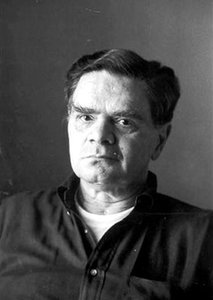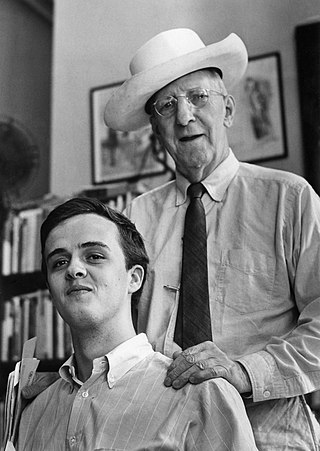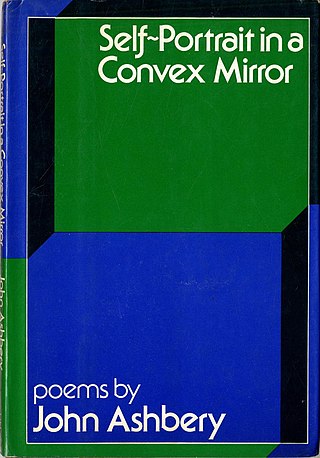Related Research Articles

Robert Lee Frost was an American poet. Known for his realistic depictions of rural life and his command of American colloquial speech, Frost frequently wrote about settings from rural life in New England in the early 20th century, using them to examine complex social and philosophical themes.

Emily Elizabeth Dickinson was an American poet. Little-known during her life, she has since been regarded as one of the most important figures in American poetry. Dickinson was born in Amherst, Massachusetts, into a prominent family with strong ties to its community. After studying at the Amherst Academy for seven years in her youth, she briefly attended the Mount Holyoke Female Seminary before returning to her family's home in Amherst. Evidence suggests that Dickinson lived much of her life in isolation. Considered an eccentric by locals, she developed a penchant for white clothing and was known for her reluctance to greet guests or, later in life, even to leave her bedroom. Dickinson never married, and most of her friendships were based entirely upon correspondence.

Prose poetry is poetry written in prose form instead of verse form while otherwise deferring to poetic devices to make meaning.

John Lawrence Ashbery was an American poet and art critic.

James Ingram Merrill was an American poet. He was awarded the Pulitzer Prize for poetry in 1977 for Divine Comedies. His poetry falls into two distinct bodies of work: the polished and formalist lyric poetry of his early career, and the epic narrative of occult communication with spirits and angels, titled The Changing Light at Sandover, which dominated his later career. Although most of his published work was poetry, he also wrote essays, fiction, and plays.
Thomson William "Thom" Gunn was an English poet who was praised for his early verses in England, where he was associated with The Movement, and his later poetry in America, even after moving towards a looser, free-verse style. Gunn wrote about his experience moving to San Francisco from England. He received numerous literary honors, and his best poems are reputed to possess a restrained elegance of philosophy.

David Lehman is an American poet, non-fiction writer, and literary critic, and the founder and series editor for The Best American Poetry. He was a writer and freelance journalist for fifteen years, writing for such publications as Newsweek, The Wall Street Journal, and The New York Times. In 2006, Lehman served as Editor for the new Oxford Book of American Poetry. He taught and was the Poetry Coordinator at The New School in New York City until May 2018.

Frank Bidart is an American academic and poet, and a winner of the Pulitzer Prize for Poetry.

Philip Levine was an American poet best known for his poems about working-class Detroit. He taught for more than thirty years in the English department of California State University, Fresno and held teaching positions at other universities as well. He served on the Board of Chancellors of the Academy of American Poets from 2000 to 2006, and was appointed Poet Laureate of the United States for 2011–2012.

James Marcus Schuyler was an American poet. His awards include the Pulitzer Prize for Poetry for his 1980 collection The Morning of the Poem. He was a central figure in the New York School and is often associated with fellow New York School poets John Ashbery, Frank O'Hara, Kenneth Koch, and Barbara Guest.

James Vincent Tate was an American poet. His work earned him the Pulitzer Prize and the National Book Award. He was a professor of English at the University of Massachusetts Amherst and a member of the American Academy of Arts and Letters.

Peter Gizzi is an American poet, essayist, editor and teacher. He attended New York University, Brown University and the State University of New York at Buffalo.
Douglas Crase is an American poet, essayist and critic. He was born in 1944 in Battle Creek, Michigan. His poetry collection, The Revisionist, was nominated for a National Book Critics Circle Award and an American Book Award. He is a former MacArthur Fellow and the recipient of a Whiting Award. Crase lives in New York City and Honesdale, Pennsylvania. His work has been published in many collections, including his poem "Astropastoral", found in The KGB Bar Book Of Poems edited by David Lehman and Star Black.
Chris Stroffolino is an American poet, writer, musician, critic, performer, and author. He worked alongside Steve Malkmus and David Berman on The Silver Jews' American Water. Stroffolino attended Albright College, Temple University, Bard College, and the University of Massachusetts Amherst before receiving a Ph.D. at State University of New York at Albany with a dissertation on William Shakespeare in 1998.

John Koethe is an American poet, essayist and professor of philosophy at the University of Wisconsin–Milwaukee.
Aldon Lynn Nielsen is an American poet, and literary critic.
Joan Vincent Murray was a Canadian American poet.

Self-Portrait in a Convex Mirror is a 1975 poetry collection by the American writer John Ashbery. The title, shared with its final poem, comes from the painting of the same name by the Late Renaissance artist Parmigianino. The book won the Pulitzer Prize, the National Book Award, and the National Book Critics Circle Award, the only book to have received all three awards.

Adam Fitzgerald is an American poet. He is the author of The Late Parade.
References
- ↑ "Collection: David Schubert (AC 1933) Collection". Amherst College Archives & Special Collections. Retrieved 16 July 2023.
- 1 2 3 Lenhart, Gary (2006). The Stamp of Class: Reflections on Poetry and Social Class . University of Michigan Press. pp. 48-9. ISBN 978-0-472-06917-0.
- ↑ Lenhart, Gary (2006). The Stamp of Class: Reflections on Poetry and Social Class . University of Michigan Press. p. 50. ISBN 978-0-472-06917-0.
- ↑ Lenhart, Gary (2006). The Stamp of Class: Reflections on Poetry and Social Class . University of Michigan Press. p. 53. ISBN 978-0-472-06917-0.
- 1 2 Ashbery, John (5 October 2000). "The Book that No One Knows". New York Review of Books.
- ↑ Schubert, David (1983). Works and Days. QRL. ISBN 9780000335814.